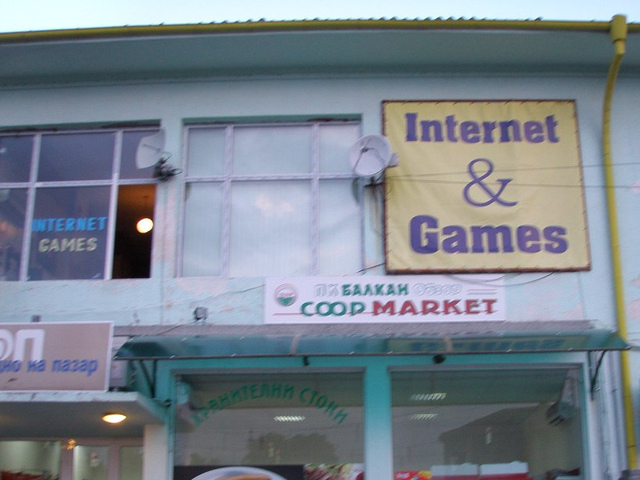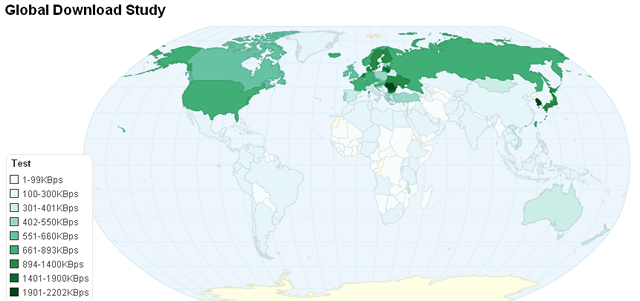
A new Global Game Download Report by Pando Networks is out, and it includes a ranking of countries by their respective average download speeds. The Pando data also features a drop-down of ten "gamer friendly" countries around the world.
"Users in the following countries are more likely to successfully complete their game downloads," the caption accompanying the list explains.
Here they are, by nation and download completion rate:
- South Korea: 94%
- Hong Kong: 93%
- Japan: 93%
- Bulgaria: 93%
- Taiwan: 92%
- Denmark: 91%
- Sweden: 91%
- Iceland: 90%
- Latvia: 90%
- Norway: 89%
Pando estimates the global average completion rate at 80.45 percent. And yes, you read the above list correctly. Bulgaria is now highly competitive with South Korea, Hong Kong, and Japan when it comes to game downloads. Note the presence of the Baltic state Latvia on the list as well. This confirms a trend that Pando noted in its analysis of the latest broadband statistics—Eastern Europe is becoming a global high-speed broadband zone, second only to various nations around the so-called Far East.

Dominating the top
In Pando's ranking of nations in general, South Korea not surprisingly prevails with an average download speed of 2,202KBps. But Romania "unexpectedly" came in second at 1,909KBps, followed by Bulgaria at 1,611KBps.
"In fact, eastern European nations dominated the top of the list with Lithuania in fourth at 1,462KBps, Latvia in fifth at 1,377KBps and Ukraine in eighth at 1,190KBps," Pando observes.
These countries are leaving the United States and the Western European nations in the dust when it comes to average high speed Internet rates. The report's Excel chart ranks the US "above average," at number 26.
Here are the average download speeds for the five top performers, followed by the US and European powers. All the Pando numbers cited below are in KBps, followed by Mbps:
- South Korea: 2,202
KBps (17.62 Mbps) - Romania: 1,909 (15.27)
- Bulgaria: 1,611 (12.89)
- Lithuania: 1,463 (11.70)
- Latvia: 1,377 (11.02)
- Switzerland: 654
(5.23) -
Germany: 647
(5.18) - United States: 616 (4.93)
- Great Britain: 599 (4.79)
Off to Lithuania
But these findings aren't that surprising or unexpected if you've been following Eastern European broadband developments. Four months ago TEO LT, Lithuania's top telecommunications service, announced that in two weeks the company would boost the speed of its ZEBRA Fiber-to-the-Home ISP service "premium" plan to up to 300Mbps for downloads.
The "basic" plan's speed would double—from 20 to 40Mbps, the company proclaimed, while the "optimal" plan will go from 80 to 100Mbps. Plus: "TEO will increase the Internet speed for residential customers without any additional fees," the press release pledged.
And if the Ookla broadband testing service's data is to be believed, by then Eastern Europe was already far ahead in terms of the percentage of advertised throughput rates that Lithuanians and their neighbors actually get (it looks like Moldovians get even more):
- Republic of Moldova, 109.21%
- Russia, 98.65%
- Slovakia, 98.64%
- Lithuania, 97.97%
- Ukraine, 97.58%
- Hungary, 96.80%
- Switzerland, 96.72%
- Bulgaria, 95.96%
- Latvia, 94.83%
- Norway, 93.97%
The Fiber to the Home Council Europe says that Lithuania is already way out in front when it comes to deployment of FTTH networks. It tops the European list at 22.6 percent household penetration. Next comes Sweden at 13.6 percent.
So these Eastern European gains have been well under way, and are now starting to bear fruit in global surveys.
Looking at Pando's new hot chart of global download speeds, one is struck not only at the divide between Asian and Eastern European countries versus the United States and the rest of Europe, but the stark gap between the global north and south.
"The disparities we found were striking," observes Robert Levitan, CEO of Pando Networks. "While, in general, developed economies outpaced the developing world in average download speeds, big names such as the US, UK, France, China and Canada were not even close to being the fastest. Instead, we saw high speeds in markets such as Eastern Europe where focus on infrastructural development and favorable geography promote a higher level of connectivity."
Listing image by Photograph by pacoofthepeople
reader comments
70